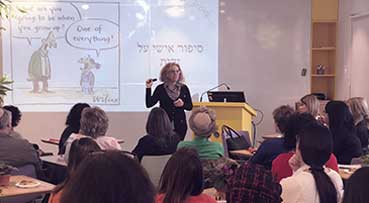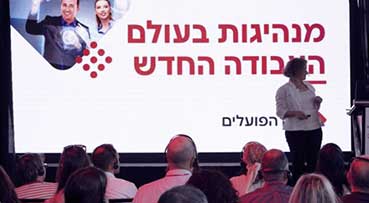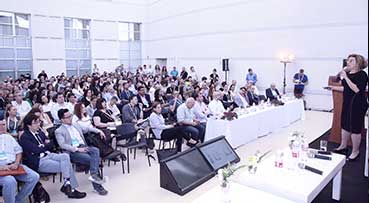As we step into 2024, embracing the lessons learned from Work@War in Israel becomes vital. These insights are not just about coping with a temporary crisis or adjusting to a new normal; they’re about thriving in any challenging environment, mirroring the unpredictable nature of modern work. In such times, organizations worldwide face a critical question: how can they help employees find tranquility amidst turmoil? Here’s what working through war in Israel taught us about the future of work.
The key lies in a fundamental shift in perspective. What we’re really managing is not time, but energy. Particularly in these strenuous times, understanding and harnessing personal energy cycles becomes essential to maintaining productivity and focus – not just for ourselves but also for our teams. Our control may be limited over external events, but we can significantly influence how we and our employees respond and adapt to these externalities. There’s a profound link between our emotional state and our work performance. Productivity stems from concentrated energy rather than mere hours logged.
The focus, therefore, should shift from quantifying work hours to optimizing the quality of focused energy invested in work. In essence, it’s about working smarter, not longer. Achieving this requires efficient energy management, recognizing that after periods of exertion (work), there must be time allocated for energy renewal (rest and recovery).
In their best-seller, “The Power of Full Engagement,” Tony Schwartz and Jim Ler highlight a critical human truth: we are not unyielding machines but beings governed by biological rhythms. Our energy levels ebb and flow naturally throughout the day. When our energy peaks, we’re primed for focus, concentration, and achievement. Conversely, when it wanes, our minds and bodies instinctively seek rest and recovery to recharge.
Ignoring these natural energy cycles can lead to physical and emotional imbalances, akin to the disorientation of jet lag, the exhaustion of shift work, or the weariness from a sleepless night. This imbalance is further exacerbated in times of war, where the mere attempt to maintain a “business as usual” approach, without acknowledging the immense stress and energy drain of the ongoing conflict, can be detrimental.
Humans aren’t built for relentless, computer-like operation – running at high speeds, multitasking extensively, and going for long stretches without a break. We function optimally when there is a balance between expending energy and replenishing it. When the scale tips, with more energy being spent than restored, our ability to function effectively diminishes. War, in itself, is an energy-draining factor, even before considering its direct impacts on the workplace.
In the challenging environment of Israel’s Work@War scenario, organizations are facing an extraordinary strain as the workforce becomes less available, both physically and emotionally. Physically, the reduction in headcount is often due to reserve duty call-ups, a unique aspect of working in a conflict zone. Emotionally, the toll is significant and complex, stemming from the stress and uncertainties of conflict. This situation is emblematic of the broader global challenge in managing workforces under pressure.
Typically, when rising demands clash with a limited workforce, the instinctive response is to extend working hours. However, this approach is inherently flawed. Time, being a finite resource, cannot be endlessly stretched to compensate for workforce shortages. Trying to do so leads to a detrimental cycle: prolonged work hours inevitably exert a physical, mental, and emotional toll. This toll manifests in decreased motivation, increased distraction, and, ultimately, high turnover rates. Such outcomes not only undermine organizational productivity but also employee well-being, echoing a lesson vital for global leaders: the importance of balancing work demands with the human capacity for sustained effort.
These challenging times are reminding us that the role of managers is more crucial than ever. They can either exacerbate the situation, draining energy through excessive workload, critical communication, or insensitivity to personal or functional challenges. For instance, an employee anxious about traveling to the office due to missile threats, concerned about a family member in the war, or struggling to manage routine in an emergency, won’t benefit from a lack of empathy or a blunt directive to “get over it.” Such an approach may technically ensure their presence at work, but it fails to foster the necessary energy for productivity and quality output.
Conversely, managers have the power to energize and support their teams, helping them navigate feelings of overwhelm and burnout. Often, simple gestures like a kind word, effective communication, genuine empathy, and showing interest can make a significant difference. An employee told me this week how much she appreciated a manager who remembered to ask about the well-being of a family member a week after hearing that they had been injured in the war.
Large organizations typically invest heavily in developing their employees’ skills, knowledge, and abilities. Yet, very few focus on building and conserving energy. This concept forms the cornerstone of the “Energy Project,” established by Schwartz two decades ago, aiming to assist managers and employees in more effectively managing their energy. When managers shift their focus from time to energy resources, the emphasis changes from extracting more from people to investing more in them. This investment not only boosts employee motivation but also enhances their capacity to contribute more fully to their work each day.
Work@War in Israel highlights the importance of this approach, especially in the context of the growing trend of workplace flexibility. Such flexibility, which allows employees to tailor work to fit their lives rather than the other way around, is invaluable in the current environment, a microcosm of work under extreme stress. It aids in replenishing energy resources amidst the various factors that deplete them. Consider, for example, the four primary areas of energy that Schwartz identifies: physical, emotional, mental, and spiritual. Each of these domains requires careful nurturing, particularly in times of crisis, to ensure sustained productivity and well-being.
Physical energy, the bedrock of our bodily strength, is fueled by nutrition, physical activity, sleep, and rest. When we transition from rigid work schedules and locations to managing energy resources, we empower individuals to make choices that best suit their needs. For instance, an employee might decide to work from home if they’ve experienced a restless night due to stress or sirens, allowing them to sleep in and start their day later. This flexibility enables them to structure their workday differently, incorporating breaks, physical activities, or relaxation periods before resuming work.
The skills required to effectively manage hybrid work environments are particularly relevant in the context of Work@War. These include coordinating available hours, enhancing the ability to work independently and asynchronously, and measuring outputs not hours worked. Developing these competencies is not only crucial for adapting to wartime conditions but also for thriving in an ever-evolving global work landscape.
Emotions: The Quality of Energy – There’s an undeniable link between our emotions and our effectiveness. Positive emotions like strength, capability, and optimism fuel our peak performance. However, when confronted with significant difficulties or unexpected challenges, negative emotions such as irritability, impatience, anxiety, and insecurity can arise. These energy-draining emotions hinder our focus and erode our patience.
Learning to recognize the triggers of such negative emotions is crucial for managing our reactions, even in regular times. However, during periods of collective difficulty, such as war, there’s an enhanced need for empathy. It’s important to understand that there will be days when it’s challenging to be at our best. Acknowledging and accommodating this reality in ourselves and others is vital for maintaining a healthy emotional energy balance.
The Brain: Focusing Energy – In times when tasks abound and time and energy seem scarce, the temptation to multitask is high. However, this approach is counterproductive. Distractions significantly deplete our focused energy. Research shows that even brief diversions from a task – such as pausing to answer an email or take a phone call – can extend the time required to complete the main task by up to 40%, a phenomenon known as “Task Switching.”
A more effective strategy is to fully concentrate for 90-120 minutes, take a replenishing break, and then move on to the next task with complete focus. This approach is where the flexibility of modern work environments, including remote work, becomes advantageous. It allows individuals who require high concentration for their tasks to better manage their work sprints and intersperse them with energizing breaks. Microsoft’s findings labeled as the “triple peak workday” reinforces the notion that when employees have the autonomy to choose their optimal work and rest times, they tend to spread their workday over three focused blocks with longer breaks in between, leading to enhanced productivity and well-being.
The Spirit: Energy of Meaning – This form of energy drives us to act, even in difficult circumstances. In Israel this is now particularly evident in the way civil society rallied since the outbreak of the war to assist survivors of the attacks and civilians evacuated from conflict zones, rescue and evacuation of animals from these zones as well as support for the families of those who were abducted or went missing during the war. Such energy of meaning can also be seen in workplaces as people are motivated not merely by the desire to return to normalcy, but because their work is perceived as important, significant, and valued. The war provides numerous instances of individuals contributing passionately, whether it’s to sustain the nation’s food supply, protect the economy, or build the future. This principle applies not only in times of war but also in the evolving landscape of work.
Your best people work not because they have to, not because you tell them to, not because you measure them on it. They work because they want to. Because working for you is their way of achieving their purpose in life.
Work@War is teaching us that the evolving world of work equips us with the tools necessary to navigate its challenges effectively. We need to prioritize the well-being of our employees, enabling them to better care for themselves and their work. The shift from rigid time management to a more flexible approach also facilitates energy cycle management, benefiting both employee welfare and productivity. This isn’t merely a personal or organizational strategy; it’s a revolutionary approach to achieving a harmonious work-life balance.
Interestingly, the necessity of managing work in times of war brings an unexpected silver lining. Without our explicit choice, we are developing managerial skills that are crucial for leading and motivating people in a dynamic, unpredictable work environment. This experience ensures that when we next face strategic, economic, or business changes, they will seem less daunting, and we’ll be well-prepared to handle them with greater ease and confidence.

![large-AX1A2125-2[1] large-AX1A2125-2[1]](https://niritcohen.com/wp-content/uploads/elementor/thumbs/large-AX1A2125-21-pnzedcs72atx5aeurqytqdiihxixlq02re9mlz805s.jpg)






